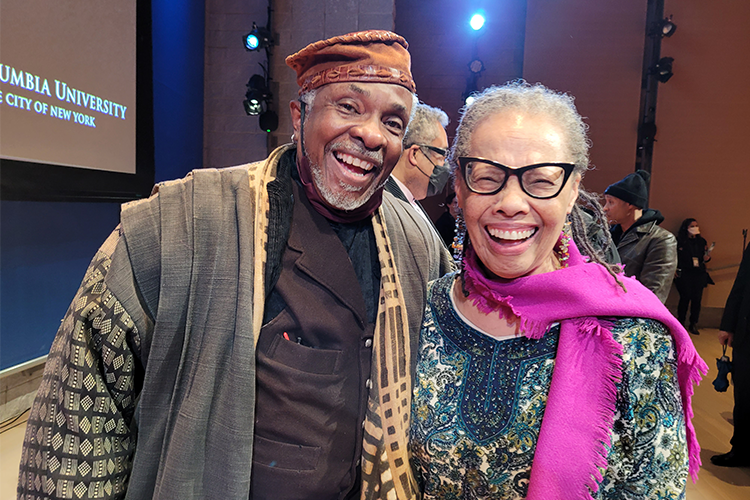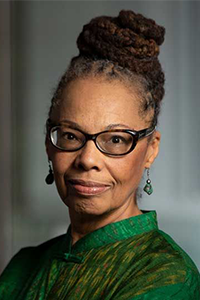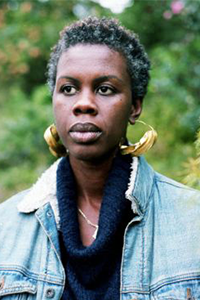'It’s Everything:' Playwright June Cross on Harlem's Significance to Her New Play, 'Douglass the Prophet'
Douglass The Prophet opens this weekend at Harlem Stage — playwright June Cross gives insight on how it came to be.

For three decades, June Cross, who founded Columbia Journalism School’s master’s program in documentary has been an award-winning filmmaker. She is acclaimed for her films Secret Daughter, which examined the impact of race and color on her own family, and This Far by Faith, a six-hour PBS series on the African American religious experience. Most recently, Cross was the director of the Columbia Journalism School/PBS FRONTLINE collaboration Whose Vote Counts, which featured her Journalism School colleague Jelani Cobb reporting on voter disenfranchisement.
Now, Cross has written Douglass the Prophet, which will have its first public performance at Harlem Stage as part of Columbia's "Such Sweet Thunder: Ellington Plays Shakespeare" public event series. The play has already attracted so much interest that it has sold out its initial four-performance run.
In this new work, Cross turns her acclaimed storytelling skills toward creating innovative live theater rooted in the facts of both American history and the enduring challenges of racism. She does so as part of a creative team with director Charlotte Braithwaite, an assistant professor of Music and Theater Arts at MIT, and Emmy Award-winning actor (and regular narrator of Ken Burns’ films), Keith David.
RELATED CONTENT
Below, Cross shares her thoughts on why Douglass the Prophet had to open in Harlem first and how the play connects to the "Such Sweet Thunder" series of events.
What inspired you to create a play based on Frederick Douglass’ life-long love of Shakespeare?
Frankly, I knew nothing of Douglass’ intersection with Shakespeare until Columbia Professor Robert O’Meally called me to see if I’d be interested in writing the play. As I recall, he said something like, “In addition to everything else he did, Frederick Douglass was also a Shakespearean scholar.” And my response was, “Wow.”
Bob and I go way back: I actually had written an adaptation of Langston Hughes’ “Simple” tales as my college thesis, and Bob was my adviser then! It took me some time, though, to develop faith in my own ability to write a play that would do justice to Douglass’ extraordinary life. Both Professor O’Meally and Professor Farah Jasmine Griffin urged me to do it. I also sought guidance from my friend, Director Charlotte Brathwaite, with whom I’ve been collaborating for the past four years. She came on board Douglass the Prophet as director this January. All of them told me to take the leap! So, finally, I did.

I started by rereading David Blight’s Pulitzer-Prize winning biography of Douglass — and then I did a deep dive into his footnotes, and read most of the five-volume series of Douglass’ letters and speeches compiled by Phillip Foner during the fifties. I read all three of Douglass’ own autobiographies. I reread Shakespeare’s tragedies — believe me, rereading the Bard as a middle-aged adult was a revelation! I also collected a library of books about Douglass, Lincoln, Reconstruction, and about Douglass and his fascination with photography. The object was to synthesize all of it and then attempt to pour it out through Douglass’ experience.
The research question which drove me at that point was: “How did enslaved African Americans find themselves in Shakespeare’s plays?” and then, “How did Douglass use Shakespeare?” I was amazed, as I went through his speeches, how often he referred to lines from Hamlet, or Othello, or even Robert Burns, Henry David Thoreau, or Ralph Waldo Emerson. He really had absorbed and synthesized the literary giants of his age. His newspaper, The North Star, published book reviews! Douglass stood at the crossroads of 19th-century literary America.
What does it mean for you that this first production is happening at Harlem Stage?
It’s everything. I had close family members who had an apartment on 141st and Convent. I just about lived there during my college years and my first sojourn in New York after college, when I was working at what was then the MacNeil/Lehrer Report (now the PBS NewsHour) at Channel Thirteen. For many years, my biological father rented a room above a pharmacy on the 125th Street-site of the present-day Magic Johnson theater.
You call this production a “work in process.” What do you mean by that and where does it goes from here?

We didn’t have the resources— either time or financial — to put on a full-fledged production, with multimedia, full lighting treatment, and sound design, which I imagined in an early script. We also didn’t have time to go through the workshopping process, a phase in which a play goes through multiple table readings, where we interrogate motivation, explore character, and deepen language, which most plays go through before they are produced. Thus, “work-in-process.”
How do you see Douglass the Prophet as part of the larger "Such Sweet Thunder" project?

At one point in my research, I discovered that Douglass referred to emancipation as the “coming thunder.” I learned that, separately, President Lincoln, in private conversations with his advisers, also referred to anti-slavery activists as spreading the “thunder” of freedom for enslaved persons. So, in my mind, freedom is the “sweet thunder” that enabled Ellington, born in Washington, DC just four years after Douglass died there, to even do what he did.
Both men carefully constructed their images through photography: Douglass as a dignified man of African descent at a time when African Americans were perceived as brutes; and Ellington also as a gentleman and a composer, always at his piano. It’s a constructed reality, aimed at forcing Americans to recognize the humanity of a people too often mistreated. And Shakespeare, as an author, embeds every emotion and motivation of humanity in the plays and sonnets he wrote. His plays, and the Bible — as Columbia Shakespeare scholar Jean Howard so helpfully explains – were the two fundamental works Douglass cited in enabling African Americans to find their humanity and express it so powerfully even when the larger world denied it.